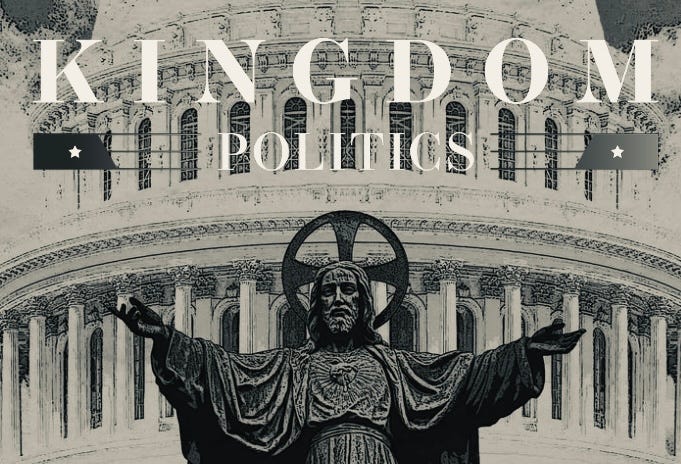Praying for the End of America
Reflecting on "Kingdom Politics" at the Center for Pastoral Theologians
Every time we pray the Lord’s Prayer, we’re praying for the end of America. To ask for God’s kingdom to come is to ask for the United States and, for that matter, every nation, to vanish. The Scriptures promise us that God will be all in all on the Last Day. The government will be upon his shoulders because he, and he alone, is the Everlasting Father.
I’ve said this to my church, Resurrection Assembly of God, on a number of occasions, and I think just about every time has been during election season (whatever that means since we’re now perpetually in election season). I always follow up my claim with an admonition not to tweet that line and that line alone. I don’t want the National Security Agency to think I’m fomenting revolt. On the contrary, Christians look for the end of America by a “marvelous transfiguration” (as Daniela Augustine has put it), not by human violence.
I’ve been reflecting on my own engagement with politics in the local church over the last week because I was once again at the Center for Pastor Theologians conference. This year’s theme was Kingdom Politics. How does the church remain political without going partisan? How do pastors help congregants navigate the tumultuous waters of this present political gloom? Who should Christians vote for?
The thing that I loved about the excellent line-up of plenary speakers, from Russell Moore to Malcolm Foley, Kaitlyn Schiess, Miroslav Volf, and Preston Sprinkle, is that no one offered easy answers to the political questions that beset the American church. Truthfully, I don’t think a single presidential candidate was named from the pulpit despite them looming large. Speakers used circumlocutions—referencing the Democrats and Republicans without giving parties or candidates free airtime. But you know what I did hear a lot? The name of Jesus. How refreshing!
I’m convinced that the church can’t maintain a faithful political witness without a return to eschatology. I said it from the mic at the conference: we’ve relegated eschatological preaching and confession to the whackos, many of them from within my own Pentecostal circles. But eschatological fervor was the Apostle Paul’s before it was ever corrupted into the selfish projections of millenarian millionaires. Go read 1 Thessalonians, and you’ll see Paul punctuating everything he says with his hope for Christ’s return. His belief in Christ’s coming kingdom is what motivated him to confront governors, centurions, and Caesar—and to disrupt the empire’s economy along the way by putting idol-making jewelers out of business (see Acts 19). Paul didn’t raise an army to overthrow the empire; he claimed every government—past, present, and future—had been relegated to interim administrators of questionable aptitude by Christ’s resurrection.
We need to pray the Lord’s prayer, and we should reflect from time to time on how Jesus taught us to pray eschatologically. To pray eschatologically is to anticipate the kingdom of God. In that kingdom, there’s only one throne and God’s on it. Put in that perspective, worrying about who becomes the next president of the United States is closer to worrying about who the next CEO of Samsung will be. No doubt it will have significant implications for us all, but not in comparison to the ultimate and final rule of Christ. Who can name the current CEO of Samsung anyway?
There was an incredible moment on the last day of the conference when Malcolm Foley said with a tongue of fire, “there is only one chosen one.” We all knew he was referring to rhetoric that has surrounded presidential campaigns in this country. He likewise knew we were all on the same page with him, so he invited us to say it. In unison, and with hearty vigor, the attendees thundered, “Jesus.” Just so, we worshipped.
Eschatology and doxology go hand in hand. When John of Patmos sees an open heaven, he joins with the angels in confessing that only God has power and authority and the final glory. As I see it, that’s the invitation to the church: to worship in light of the End. We don’t need a candidate in the presidential office, we don’t need to prove by our votes that we’re Christians, and we surely don’t need America to be Christians.








This is so true, and timely. God bless.
Nice piece Joseph. There is a difficult tension. To the intense chiliasm of 1 Thessalonians we must add something like Jeremiah 29,
'5 Build houses and dwell in them; plant gardens and eat their fruit. 6 Take wives and beget sons and daughters; and take wives for your sons and give your daughters to husbands, so that they may bear sons and daughters—that you may be increased there, and not diminished. 7 And seek the peace of the city where I have caused you to be carried away captive, and pray to the Lord for it; for in its peace you will have peace. 8 For thus says the Lord of hosts, the God of Israel: Do not let your prophets and your diviners who are in your midst deceive you, nor listen to your dreams which you cause to be dreamed. 9 For they prophesy falsely to you in My name; I have not sent them, says the Lord.'
All of the false prophets were telling the people that their Babylonish captivity would be over shortly. Jeremiah had the sickening job of telling them that most of them would live out their whole lives without ever seeing Jerusalem again, ever participating in the corporate worship of the Lord again. Had they had a voice in Babylonian politics, rather than being captives, I don't think that Jeremiah would have been against them being politically active. No doubt, 'seeking the peace' of Babylon would involve supporting, vocally and openly, leaders who would 'exalt the nation' through righteousness.
I really don't see any hope for us as a people until the Lord intervenes, whether terminally or in a more intermediate way. And I hope that it is soon. But a lot of Christians are legitimately 'seeking the peace' of America through politics and related efforts and I don't have any criticism for them. I might questions their facts but not their motives or their hearts.